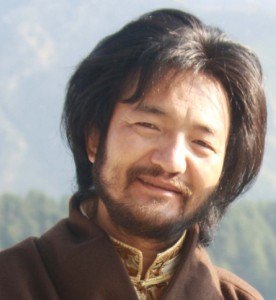 I do not feel comfortable welcoming guests and tourists to Dharamsala, like a local or an Indian citizen would. The sole reason being, I am also a guest myself in India. I am after all an escapee from my own land and nation. Nevertheless, Dharamsala is an important tourist attraction for people who come to India. For most people, they have this image of a ‘Little Lhasa’ in their minds when they come here. For better or for worse, I am one of the ingredients that make up this ‘Little Lhasa’ and I can’t deny the fact. So taking this fact into consideration, maybe then I can welcome you to Dharamsala, with no dime spent but only my behavior and character to be considered.
I do not feel comfortable welcoming guests and tourists to Dharamsala, like a local or an Indian citizen would. The sole reason being, I am also a guest myself in India. I am after all an escapee from my own land and nation. Nevertheless, Dharamsala is an important tourist attraction for people who come to India. For most people, they have this image of a ‘Little Lhasa’ in their minds when they come here. For better or for worse, I am one of the ingredients that make up this ‘Little Lhasa’ and I can’t deny the fact. So taking this fact into consideration, maybe then I can welcome you to Dharamsala, with no dime spent but only my behavior and character to be considered.
For me, the three main ingredients that make up ‘Little Lhasa’ are: His Holiness the Dalai Lama; the Central Tibetan Administration and the Gu Chu Sum Movement of Tibet
In the following sentences, I will point out why I have chosen these three elements of the Tibetan community.
Now even if we have lost our land to China, our nation’s spirit and soul are still alive, and that fact is solely evident from the Dalai Lama’s living presence in Dharamsala. He is here in person and in his residence. Secondly, China has occupied the whole of Tibet but as a symbol of retaliation to the unjust occupation, we have our Tibetan-government-in-exile in Dharamsala. Now the most important of all these points is the fact that despite decades of occupation, Tibetans still cannot live under the People’s Republic of China’s (PRC) occupation, which is visible from the ever-increasing number of Political Prisoners in Tibet and an organization set up in exile by and for Political prisoners. These are people who had to tear themselves away from the strong bonds of their families, give up the comfort of living with their parents, spouse, children, all the people who love them and whom they love. We have a term in Tibetan which is roughly translated as ‘Alive yet Separated’. On the physical surface of their beings, they have borne every possible torture that the Chinese government could bestow.
Due to the natural cycle of life, the Dalai Lama is now heading to his 80th year on this earth. Based on political changes, the Tibetan government in exile has become the Central Tibetan Administration (CTA). The Gu Chu Sum Movement of Tibet, on the other hand, has been in existence for over 20 years now, and despite the many pressures and hardship we face, we still stand strong like the Dhauladhar mountains that surround Dharamsala. However hard the challenges we face, we still stand with hearts as wide as the Kangra valley. This is because the flow of the number of political prisoners will not cease until the occupation of the PRC comes to an end in Tibet.
This fact alone decides the fate of the Gu Chu Sum Movement of Tibet, it will have to go on existing, and to thrive to carry forward the resolution of the people who will not give in to oppression and suppression. Yet, in order to continue our existence, we still need humane support and the ideas and wisdom from the rest of the world. For that matter, our doors are always open to you. Maybe, you can help us and maybe we can help you.
*Established in 1991, the Gu-Chu-Sum Movement of Tibet’s primary aim is to provide food, shelter, financial help, medical attention, education, jobs and psychological support to former prisoners of conscience. Many ex-political prisoners arrive in India with nowhere to stay, no job and very little education. Some have long-standing health problems as a result of severe abuse while in custody. Currently, GuChuSum has more than 500 members.




 Print
Print Email
Email













